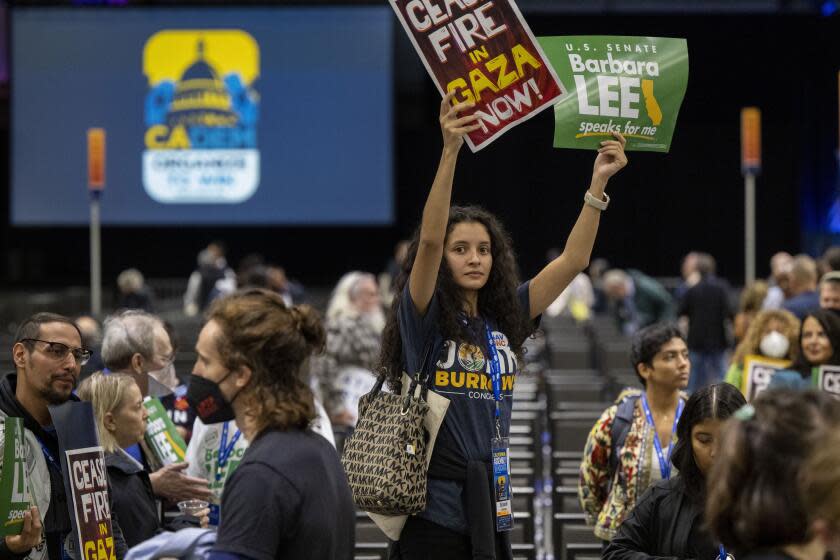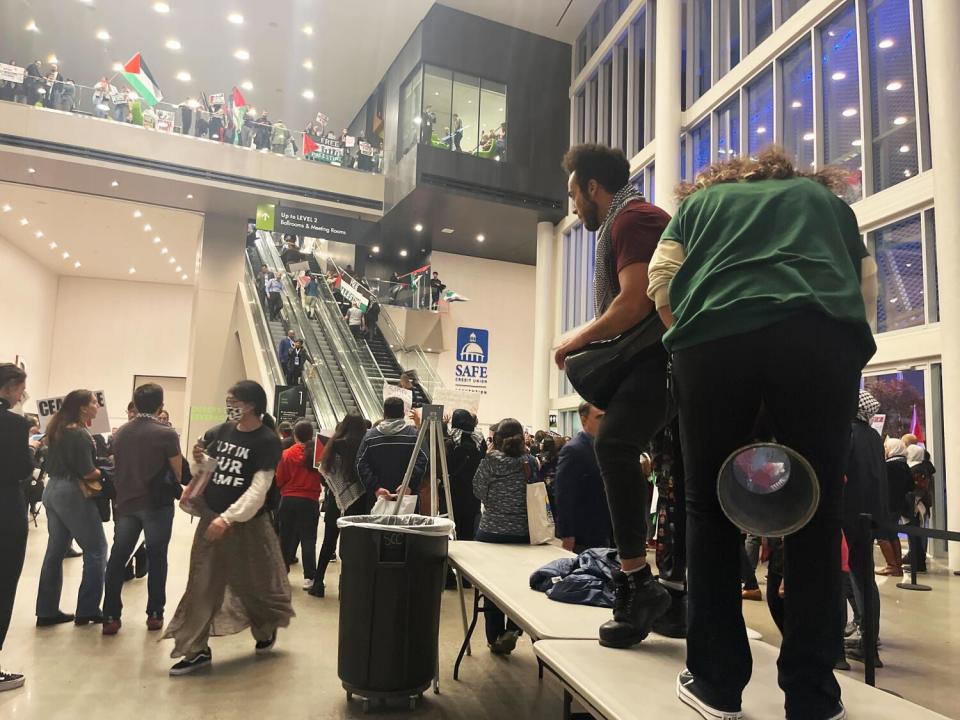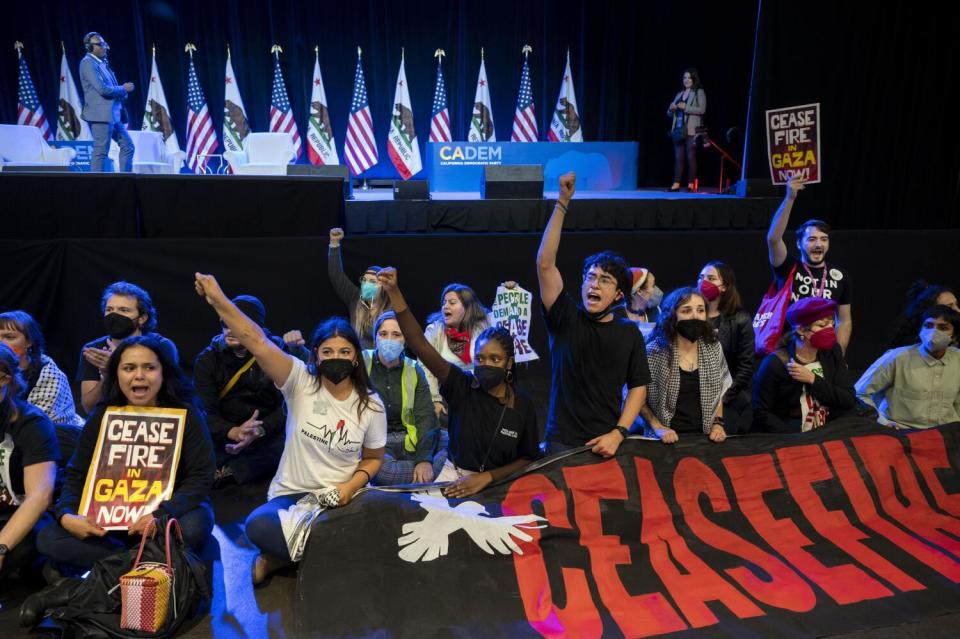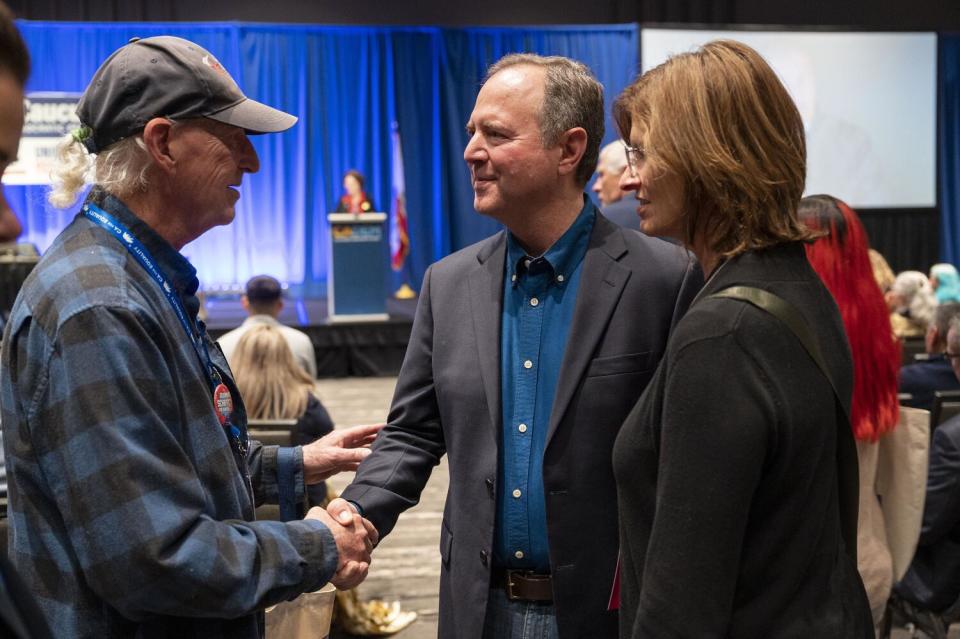Democrats are split on Israel and the race for Feinstein's Senate seat, as 2024 looms

For the record:
7:33 p.m. Nov. 19, 2023: An earlier version of this article stated that Rep. Barbara Lee cast the only no vote on the authorization for the use of military force allowing the invasion of Iraq after the Sept. 11 terrorist attacks. The country involved was Afghanistan.
The California Democratic Party Convention provided an opportunity for a show of unity as delegates and activists head into a high-stakes election year.
But the weekend-long gathering proved to be anything but that.
Democrats remained divided on the most pivotal issues facing the party and the nation: the raging war between Israel and Hamas and a 2024 California race featuring three popular party members, congressional veterans, hoping to win the seat held by the late Sen. Dianne Feinstein for more than three decades.
The internal fissures mirrored the national debate within the party that some believe could imperil the reelection hopes of President Biden and the balance of power in Congress.
Israel's deadly invasion of Gaza in the aftermath of Hamas' Oct. 7 attack dominated the convention. Protesters angry about the war disrupted a Senate candidate forum Saturday afternoon and later in the evening stormed into the Sacramento convention center, just blocks from the state Capitol, leading to the cancellation of official party events that evening.
"An injustice to one is an injustice to all," said delegate and lawyer Magali Kincaid, who joined with protesters who disrupted the remarks of Senate candidates Reps. Katie Porter and Adam B. Schiff along with Lexi Reese.

Kincaid, who supports Rep. Barbara Lee (D-Oakand) for Senate, joined a Saturday afternoon rally where demonstrators loudly chanted "Cease-fire," which briefly disrupted the Senate candidates. She said that she wanted to see "peace not war" in Gaza and that any resolution to what's playing out with hostages in Gaza shouldn't involve more violence.
"We need to make sure to stand up to genocide and colonization and it's what I feel like we were doing," Kincaid said.
The clash among delegates and protesters over the death and destruction in Israel and Gaza has angered young voters in particular. Ameera Abouromeleh, an 18-year-old Palestinian American who joined the protest with six members of her family — including her 74-year-old grandfather who she said was born in Jerusalem — said she looks forward to voting next year for the first time as a way to show solidarity with family who remain in the West Bank.
“Even though you squish someone under the rubble, our voices will be heard further," said Abouromeleh.
Her grandfather Naff was less enamored with the civil disobedience, mostly content to support his grandchildren. He felt the violence by both Israelis and Palestinians had gone too far and wanted there to be a durable and sustainable resolution to the conflict.
Abouromeleh was unsure whom to back in the Senate race but in the presidential election she plans to vote for Cornel West, a progressive academic who is running as an independent. A newly released poll from NBC News showed that 70% of voters 18 to 34 disapprove of Biden's handling of the Israel-Hamas war. It came as his popularity declined to 40% — the lowest level of his presidency.

The events of the weekend angered many Jewish delegates — some who said they felt harassed and unsafe at the convention. They criticized state Democratic Party leader Rusty Hicks for not doing enough to protect members and prevent disruptions. Andrew Lachman, president of Democrats for Israel California and a Jewish delegate, said he'd heard from more than a dozen people who either were reluctant to come to the convention or didn't come because they worried about antisemitic confrontations.
Lachman said they were right to be worried given what played out.
"Many were shaken from the disruptive and violent acts they saw," Lachman said.
Read more: The same California Senate seat will be on your ballot four times in 2024. Here's why
The split within the party could imperil the party's success in the 2024 election, Lachman said. Democrats will need the support of Jewish and Muslim voters in battleground states and congressional districts if they want to hold the White House and make legislative gains.
"We can't win Michigan or Virginia without Muslim votes. You can't win Nevada or Pennsylvania without the Jewish community," Lachman said. "So anyone who thinks that they can shout the other one out of the room is hurting the Democratic Party."
On Sunday, Hicks condemned the behavior of protesters and said that "any delegate who actively participated in or aided in the furtherance of those activities and events ... will be held accountable."
Saturday "concluded with a series of events that left me both deeply saddened and disappointed," he added.
The most anticipated vote among party delegates over the weekend was for California's 2024 Senate race, with pits Lee against fellow Democratic Reps. Schiff of Burbank and Porter of Irvine. In 2018, the California Democratic Party sent a clear message when members voted to back then-state lawmaker Kevin de León over Feinstein. This time though, no candidate reached the 60% threshold necessary to get the nod.

Lee won 41.5% of the delegates with Schiff coming in a close second 40.2%. Porter came in third with 16%.
Though Lee has lagged behind Schiff and Porter in recent opinion polls, her support among Democratic delegates reflected the strong loyalty she inspires among the party's faithful who tend to be more liberal than the broader voting electorate. During Saturday's forum, her supporters cheered after as she reiterated her call for a cease-fire in Israel and Gaza along with her casting the only no vote on the authorization for the use of military force allowing the invasion of Afghanistan after the Sept. 11 terrorist attacks.
Basem Manneh, a Bay Area Palestinian American who supports Lee and is a delegate, said he was frustrated by the disruptions of the Senate forum. The broader push for a cease-fire and the moves to help Lee were the "right way to approach solidarity," he said. He spoke at the evening protest inside the building and felt there was little evidence that the disobedience was anything but peaceful and constructive.
"I don't see any of this as a hateful message."
Manneh, who works at San Francisco International Airport, said both Porter and Schiff were very smart but that Lee has been at this work far longer.
"She's that captain of the locker room," Manneh said.

Brian Krohne, 41, who had campaigned for Porter in her congressional races is supporting Lee partially because of Porter's unwillingness to call for a cease-fire in Israel and Gaza.
Porter and Schiff have been broadly supportive of Biden's efforts to support Israel while gently urging its leaders to be more mindful of civilian loss of life and thinking about what comes next in Gaza.
"I find it so disappointing she's on the wrong side of this," Krohne said of Porter.

Hicks and other state party officials said that the divided party was a reflection of the strength of the candidates and that these divisions wouldn't hurt Democrats' ability to come together next year.
Riverside County Party Chair Joy Silver, a Jewish Palm Springs resident, said she never felt unsafe during the protests Saturday, but was angry that they prevented the party caucuses from convening — adding they seemed "deeply un-democratic."
The splits in the party were profound, she said, but wouldn't deter her work overseeing voter outreach in one of the most competitive parts of the state where Democrats are eager to regain a congressional seat and take some Assembly seats. The county party hadn't endorsed in the Senate race, but she was backing Schiff. She compared the divide between Schiff and Lee to the one that the party experienced between former Secretary of State Hillary Clinton and Sen. Bernie Sanders in 2016.
"The real division here, I think is between the head and heart," Silver said.
"Adam is more head and Barbara Lee is more heart."
This story originally appeared in Los Angeles Times.


